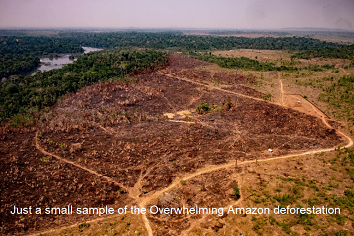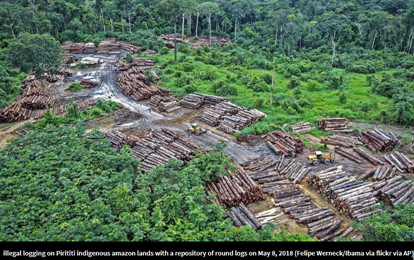| The Amazon Basin sprawls across eight countries (Bolivia, Brazil, Colombia, Ecuador, Guyana, Peru, Suriame, and Venezuela) and one overseas department of France (French Guiana). In recent years, research and policy communities have developed a sound understanding of deforestation and degradation dynamics in the region and the ways economic actors exploit forest resources under different state regimes. |
Santa Cruz, May 2.– In Bolivia, prospectors are digging craters and poisoning rivers in Madidi National Park. This natural treasure stretches from the Andes to the Amazon. Intensive farming, meanwhile, is ravaging the country’s Amazon forests, including the Chiquitania, the largest dry forest in the world. Fires set, mostly to illegally clear land, often turn into runaway blazes that leave behind deserts of scorched earth.
Bolivia’s 60 million hectares of Amazon– which spans part of the departments of Pando, Beni, Cochabamba, La Paz, and Santa Cruz– boasts some of the basin’s most biodiverse wilderness. Bolivia’s Amazon is often forgotten, with other countries receiving the bulk of international attention. Yet, the country trails only Brazil in terms of annual forest loss.
 In 2022, Bolivia lost a record 245,177 hectares of primary forest, the most ecologically significant forests on Earth for carbon storage — which accounted for 12.4% of the total deforestation across the Amazon that year. To put that in perspective, Colombia’s and Peru’s Amazon regions, which combined form a territory of some 127 million hectares, or just over double that of Bolivia, accounted for just 12.2%, according to the Monitoring of the Andean Amazon Project (MAAP), a network dedicated to tracking deforestation in the Amazon.
In 2022, Bolivia lost a record 245,177 hectares of primary forest, the most ecologically significant forests on Earth for carbon storage — which accounted for 12.4% of the total deforestation across the Amazon that year. To put that in perspective, Colombia’s and Peru’s Amazon regions, which combined form a territory of some 127 million hectares, or just over double that of Bolivia, accounted for just 12.2%, according to the Monitoring of the Andean Amazon Project (MAAP), a network dedicated to tracking deforestation in the Amazon.
Most deforestation in Bolivia’s Amazon is driven by gold mining and widespread land clearing for agribusiness. In other Amazonian countries, such activities are illegal or at least regulated.
Bolivia has only a semblance of laws designed to stop environmental destruction. The reality is that actors involved in deforestation are left unchecked by the government...

[ Full text ]
Comments powered by CComment